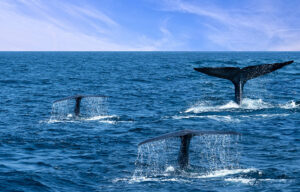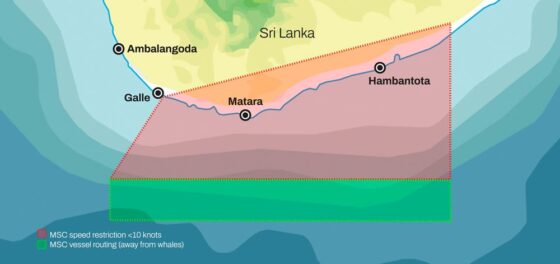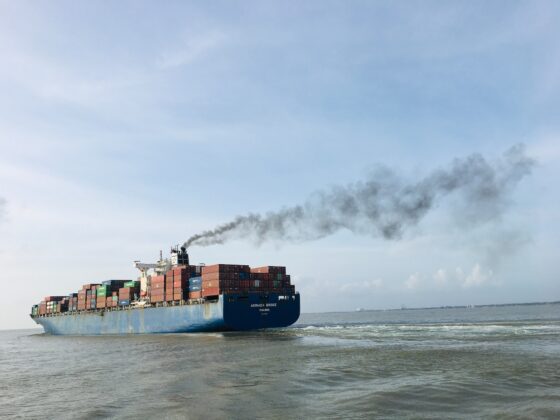
World’s largest container line adjusts routes to protect blue whales

The world’s largest container line, MSC Mediterranean Shipping Company, is voluntarily re-routing its vessels past Sri Lanka, in a bid to protect the blue whales and other cetaceans living and feeding in the waters off the coast.
The new course is approximately 15 nautical miles to the south of the current traffic separation scheme (TSS) for commercial shipping.
MSC says it is modifying navigation guidance in line with the advice of scientists and other key actors in the maritime sector, including the International Fund for Animal Welfare (IFAW), the World Trade Institute (WTI), Biosphere Foundation, University of Ruhuna (Sri Lanka), Raja and the Whales and University of St Andrews (UK).
An exception has been made for vessels embarking and disembarking for safety reasons in Galle, including in case of adverse weather. Additionally, smaller feeder ships sailing around the Bay of Bengal will reduce their speed to less than 10 knots in this area.

The port of Colombo in Sri Lanka is a major transshipment hub for global trade. Image courtesy of MSC
The area off Sri Lanka’s southern coast is one of the busiest shipping lanes in the world and is also inhabited by large populations of cetaceans, meaning that these animals may be at risk of colliding with ships.
MSC says simulations have shown that moving the official shipping lane 15 nautical miles to the south could reduce the strike risk to blue whales by as much as 95 per cent. However, despite years of advocacy by scientists, the shipping industry and NGOs, the boundaries of the official shipping line have not been reassigned to reduce the risk of ship strikes on cetaceans.
“We believe that the commercial shipping sector has an important role to play in protecting cetaceans, specifically in helping to reduce the risk of ship collisions with whales,” says Stefania Lallai, vice president for sustainability at MSC Mediterranean Shipping Company.
“MSC is proud to rank at or near the top of whale safety shipping rankings. However, we are not at all complacent. We believe that raising awareness of these issues and encouraging collaboration between industry, scientific bodies, civil society, and governments is essential as we strive collectively to do more to minimise the risk of ship strikes.”

A container ship leaving the port of Colombo
Earlier this year, MIN reported on a study that concludes ship strikes could be responsible for falling populations of endangered marine species.
In Sri Lanka specifically, the liner shipping industry led by the World Shipping Council, of which MSC is a member, has advocated creating a new official marine traffic scheme that is fully separated from the blue whale feeding area. It is hoped that this will soon become a reality, so all large-scale commercial marine traffic moves to the more southerly zone that MSC ships are now guided to follow.
In the meantime, MSC says it urges all other ship operators to consider choosing a more southerly route past Sri Lanka, to significantly reduce the possibility of whale strikes.
Swiss-Italian company MSC recently overtook Maersk as the world’s largest container line by operated container vessel capacity, with a fleet capable of carrying 4.3 million standard 20-foot containers.
